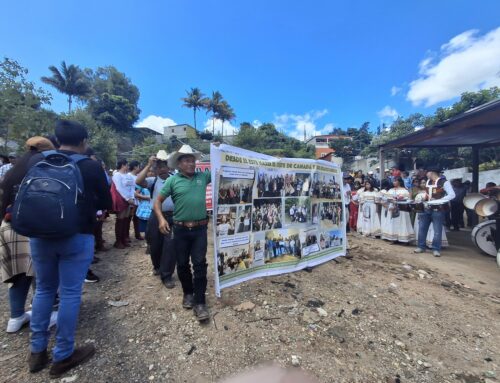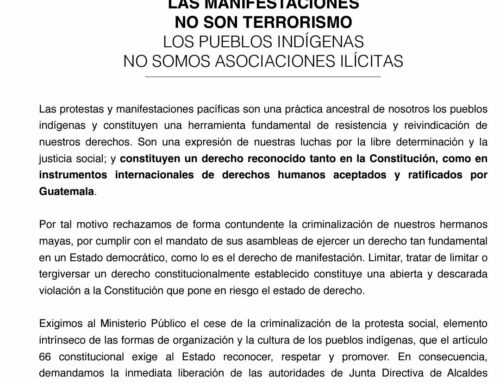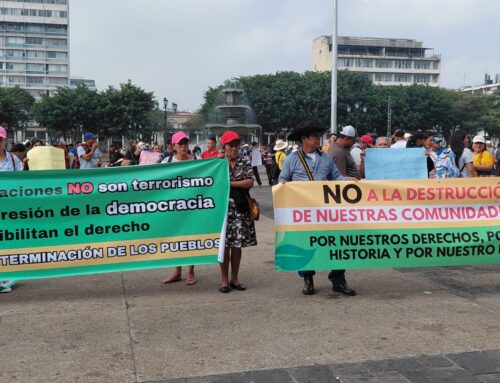Let us wake up! Let us wake up, humankind! We’re out of time. We must shake our conscience free of the rapacious capitalism, racism, and patriarchy that will only assure our own self-destruction. The Gualcarque River has called upon us, as have other seriously threatened rivers. We must answer their call. Our Mother Earth – militarized, fenced-in, poisoned, a place where basic rights are systematically violated – demands that we take action. Let us build societies that are able to coexist in a dignified way, in a way that protects life. Let us come together and remain hopeful as we defend and care for the blood of this Earth and of its spirits. –Bertha Cáceres, upon accepting the Goldman Environmental Prize, 2015
We do not want silence. We want to continue in resistance, in the battle for peace. Her voice cannot be silenced and her name cannot be erased from history. –Víctor Caal Tzuy, ACODET leader and former NISGUA tour speaker, reacting to Bertha Cáceres’ assassination
The Association of Communities for Development, Defense of Territory and Natural Resources (ACODET) celebrated their eighth annual General Assembly on March 5, together with representatives from more than 35 indigenous communities. The assembly began by honoring the life and resistance of Bertha Cáceres, a Honduran environmental activist and indigenous leader of the Lenca people who was assassinated on March 3. She co-founded the Council of Popular and Indigenous Organizations of Honduras (COPINH) to work in support of indigenous rights in Honduras and worked on numerous campaigns against illegal logging, plantations, and dams.
In 2015, Cáceres won the Goldman Environmental Prize for her resistance to the Agua Zarca cascade of four hydroelectric mega-dams on the Gualcarque River, a project that began without consultation of the affected populations and whose construction has been held up thanks to her campaign efforts. Cáceres faced frequent threats, criminalization and intimidation for her work.
In the early hours of March 3, assassins murdered her in her home while she slept, also wounding Mexican activist Gustavo Castro Soto. Castro Soto, founding director of Otros Mundos – Chiapas, is an ecological justice activist and despite fully cooperating with the investigation, remains unjustly detained by Honduran authorities. Over the last several years, he has actively supported ACODET and other groups in Guatemala who defend land, rivers and life.
Both the life of resistance and the death of Cáceres and the wounding of Castro Soto speak loudly to the members of ACODET. The communities stand in opposition to the construction of the Xalalá Dam, a project previously pushed forward by the National Institute of Electrification (INDE). The dam’s construction would reduce water access or fully displace 58 communities near the Chixoy and Copón rivers, and indirectly affect an additional 44 communities. The project was overwhelmingly rejected by more than 90 percent of the 18,000 participants during community consultations in 2007 and 2010. For their efforts, these community members have also faced constant threats and violence.
In memory of Cáceres’ life, assembly attendees applauded for a full minute as ACODET leader Víctor Caal Tzuy proclaimed, “We do not want silence. We want to continue in resistance, in the battle for peace. Her voice cannot be silenced and her name cannot be erased from history.”
During the assembly, the members celebrated the successes of the previous year, including the April 2015 announcement that INDE had officially cancelled its contract for a geographical feasibility study with Brazilian company Intertechne Consultores S.A. The cancellation came after ACODET filed a successful injunction against the contract in Guatemala’s Constitutional Court in 2014, citing irregularities in the granting process of the contract.
They also celebrated the 2015 forced resignation of former President Otto Pérez Molina, former Vice President Roxanna Baldetti, and other high-ranking members of Molina’s administration. Members of ACODET joined the massive protests throughout 2015 that called for the President’s resignation and an end to corruption following CICIG’s revelation of his involvement in La Línea, a customs fraud ring that defrauded the state of millions of dollars.
Several cabinet members who resigned last year played important roles pushing forward the Xalalá Dam as a national priority – including the heads of the Ministry of Energy and Mines (MEM) and the Ministry of Environment and National Resources (MARN). Likewise, the manager of the Xalalá Dam project, Widthmark Estrada, responsible for significant local pressure against the communities in opposition to the dam, was forced to step down after questions arose about his management of project funds.
While the ACODET communities celebrated another year of successful resistance to the dam, threats they face under the new administration of President Jimmy Morales remain ongoing. Morales has reaffirmed commitment to the U.S.-backed Alliance for Prosperity, a regional plan which calls for increased investment in dams, mines, petroleum exploration and African palm cultivation, despite the fact that the imposition of these projects in Central America has consistently been carried out alongside serious human rights violations.
The communities reaffirmed their resistance to these plans through revitalized communication and training efforts in affected communities, collaboration with other national and regional groups, and calls for solidarity to the international community. In 2014, ACODET nominated Víctor Caal Tzuy, a maya Q’eqchi’ leader and director of ACODET, as a participant in NISGUA’s U.S. speaking tour, where he spoke about the organization’s fight to protect self-determination for indigenous peoples. As follow-up to the tour, a NISGUA delegation visited the organization in the region.
NISGUA remains committed to standing in solidarity with ACODET and with indigenous communities throughout Central America as they peacefully continue the struggle to defend their lives and territory in the face of abuses by state and transnational corporate actors.
NISGUA has engaged in strategic campaign work in support of ACODET since their founding in 2006, in addition to providing international human rights accompaniment through the ACOGUATE project.






Leave A Comment